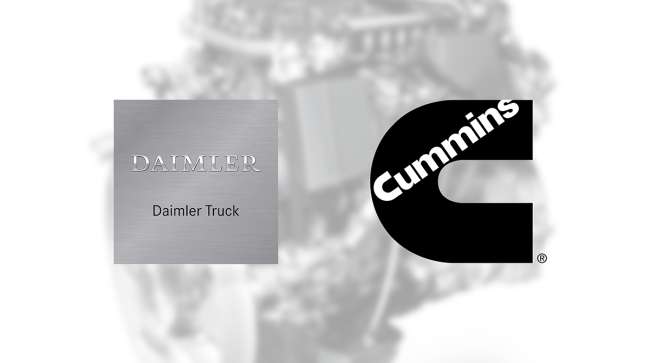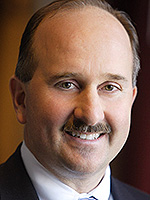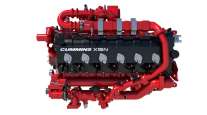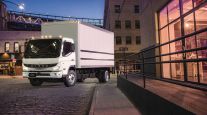Senior Reporter
Daimler Truck AG Taps Cummins to Supply All Medium-Duty Engines

[Stay on top of transportation news: Get TTNews in your inbox.]
Daimler Truck AG and Cummins Inc. announced a global partnership for medium-duty diesel engine development and production, and are considering other potential collaborations.
Their memorandum of understanding more closely links the world’s largest truck maker and the world’s leading independent engine maker, which already do business together.
Cummins will establish an engine plant at the Mercedes-Benz factory in Mannheim, Germany, to produce medium-duty engines compliant with the Euro VII emissions standard beginning in the second half of the decade.
"Our partnership is a terrific opportunity...to be more competitive, drive global innovation, expand offerings to customers and reduce emissions." @Cummins and @Daimler Truck AG announce global plan for medium duty commercial vehicle engines. https://t.co/DZmydmiI9g #Cummins — Cummins Inc. (@Cummins) February 23, 2021
Daimler’s current medium-duty diesel engine generation will end with the start of production of the Cummins engines at Mannheim.
The change reaches to Portland, Ore.-based Daimler Trucks North America.
According to DTNA, its medium-duty vehicles will shift to Cummins-only engines along the same schedule in the second half of the decade.
DTNA in 2020 was the top U.S. customer for Cummins’ Class 7 engines, according to WardsAuto.com.
Cummins engines — along with DTNA’s Detroit brand — are available as an option on DTNA’s lighter medium-duty vehicles, now too.
Heavy-duty engines will remain in Daimler’s portfolio and continue to be manufactured in Mannheim and Detroit.
Driving forward together: @Daimler Truck AG & @Cummins have announced a joint global plan for medium-duty commercial vehicle engines. As part of the strategic partnership, Cummins Inc. will establish an engine plant in the @MercedesBenz Mannheim campus https://t.co/nqXTAZOyCE pic.twitter.com/f768cgPIOY — Daimler Trucks & Buses (@DaimlerTruckBus) February 23, 2021
More strict European emissions requirements, Euro VII, are taking final shape this year and helped to spur the new agreement.
“With the changeover to Euro VII, we would have to invest considerable resources in the further development of our medium-duty engines,” Daimler Truck CEO Martin Daum said in a release. “We are now freeing up these funds to focus them on the [alternative and emerging technologies, including nondiesel engines] that are crucial to our long-term corporate success in the transformation of our industry.”
Euro VII standards are focused on reducing emissions of nitrogen oxide from trucks and buses. Euro VI was introduced in 2015. Both standards are part of a larger European effort to get to no net emissions of greenhouse gases in 2050.
Cummins Chairman and CEO Tom Linebarger said it was an important strategic partnership and “a terrific opportunity for both companies to be more competitive, drive global innovation, expand offerings to customers and reduce emissions. Cummins is committed to ensuring any customer anywhere has the right solution, by offering them a broad range of power solutions from advanced diesel, near-zero natural gas, fully electric, hydrogen and other technologies.”
The partnership dovetails into both companies’ business models and out-year plans, said Glen Kedzie, energy and environmental affairs counsel at American Trucking Associations. “New synergies created between both companies will result in a greater focus in the development and deployment of the next generation of trucks as the trend toward lower-emission pathways continues to rapidly advance.”
Another industry expert said the agreement was another sign of the transformative times in the trucking industry in light of existing and future anticipated Clean Air and greenhouse gas rules.

Schaeffer
“It is clear that both advanced diesel and electric [powertrains] are going to be needed to serve the trucking industry in the future and tackle the global climate challenge, so this Cummins-Daimler arrangement makes perfect sense, matching two leaders in technology and market share, one in engines and the other in trucks, and leveraging the best of both,” said Allen Schaeffer, executive director of Diesel Technology Forum. “The customer should be the winner here.”
Mike Roeth, executive director of the North American Council for Freight Efficiency, was not surprised by the announcement.
“Once, all we had were diesel engines. Now we’ve got hydrogen, hybrids, natural gas, battery-electric — they all have to bring those various powertrains to market over the next 10, 20 years and they can’t afford to do that. That’s why we are seeing all these deals, and partnering and teaming and all that,” Roeth said. “There’s a lot of work to do.”

Roeth
He noted Cummins faces the same challenges but it has more scale. They want to be “an option everywhere, and if you are an option everywhere you have potentially more volume than being first in any one category.”
Meanwhile, Daimler Truck is poised to transition into a stand-alone, publicly traded company upon completion of a major reorganization, parent company Daimler AG announced Feb. 3.
Under the plan, Daimler AG would rename itself Mercedes-Benz, and the truck and bus unit would become Daimler Truck AG. Like the truck unit, the car business would be individually traded.
The transaction and the listing of Daimler Truck AG on the Frankfurt Stock Exchange is expected to be complete before year-end 2021, according to Stuttgart, Germany-based Daimler.
The parent company noted the steps are needed to unlock the full potential of its businesses in a zero-emission, software-driven future.
Want more news? Listen to today's daily briefing below or go here for more info:




